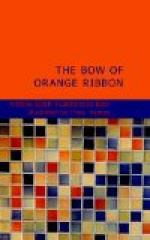“I do not wish to make you more expenses, Captain;” and Cohen, following the impulse of his anxiety, laid his hand upon his debtor’s arm. Hyde turned in a rage, and flung off the touch with a passionate oath. Then the Jew left him. There was neither anger nor impatience visible in his face or movements. He cast a glance up at the City Hall,—an involuntary appeal, perhaps, to the justice supposed to inhabit its chambers,—and then he walked slowly toward his store and home.
[Illustration: Hyde flung off the touch with a passionate oath]
Both were under one roof,—a two-storied building in the lower part of Pearl Street, dingy and unattractive in outward appearance, but crowded in its interior with articles of beauty and worth,—Flemish paintings and rich metal work, Venetian glasses and velvets, Spanish and Moorish leather goods, silverware, watches, jewellery, etc. The window of the large room in which all was stored was dim with cobwebs, and there was no arrangement of the treasures. They were laid in the drawers of the great Dutch presses and in cabinets, or packed in boxes, or hung against the walls.
At the back of the store, there was a small sitting-room, and behind it a kitchen, built in a yard which was carefully boarded up. A narrow stairway near the front of the store led to the apartments above. They were three in number. One was a kind of lumber-room; a second, Cohen’s sleeping-room; and the largest, at the back of the house, belonged to the Jew’s grandchild Miriam. There was one servant in the family, an old woman who had come to America with Jacob. She spoke little English, and she lived in complete seclusion in her kitchen and yard. As far as Jacob Cohen was concerned, he preserved an Oriental reticence about the women of his household; he never spoke of them, and he was never seen in their company. It was seldom they went abroad; when they did so, it was early in the morning, and usually to the small synagogue in Mill Street.
He soon recovered the calmness which had been lost during his unsatisfactory interview with Captain Hyde. “A wise man frets not himself for the folly of a fool;” and, having come to this decision, he entered his house with the invocation for its peace and prosperity on his lips. A party of three gentlemen were examining his stock: they were Governor Clinton and his friends Colden and Belcher.
“Cohen,” said Clinton, “you have many fine things here; in particular, this Dutch cabinet, with heavy brass mountings. Send it to my residence. And that Venetian mirror with the silver frame will match the silver sconces you sold me at the New Year. I do not pretend to be a judge, but these things are surely extremely handsome. Pray, sir, let us see the Moorish leather that William Walton has reserved for his new house. I hear you are to have the ordering of the carpets and tapestries. You will make money, Jacob Cohen.”
“Your Excellency knows best. I shall make my just profits,—no more, no more.”




